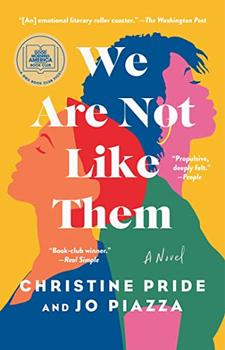Summary | Excerpt | Reading Guide | Reviews | Beyond the Book | Read-Alikes | Genres & Themes | Author Bio

A Novel
by Christine Pride, Jo PiazzaThis article relates to We Are Not Like Them
 A key scene in We Are Not Like Them occurs when one character impulsively stops at the National Memorial for Peace and Justice and its associated Legacy Museum in Montgomery, Alabama.
A key scene in We Are Not Like Them occurs when one character impulsively stops at the National Memorial for Peace and Justice and its associated Legacy Museum in Montgomery, Alabama.
Both the memorial and the museum were created as a result of efforts by the Equal Justice Initiative (EJI) to honor those Black Americans who were enslaved, terrorized by lynching, those who suffered racial segregation, and individuals who are "burdened with contemporary presumptions of guilt and police violence." Formed in 1989 by Bryan Stevenson (a public interest lawyer and the author of Just Mercy), EJI's efforts are focused in three main areas: criminal justice reform, racial justice and public education. Work on the memorial began in 2010 as EJI started investigating the thousands of lynchings that took place in the American South, many of which had never been documented. The group believes that "publicly confronting the truth about our history is the first step towards recovery and reconciliation," and thought a space should be created that would prompt others to "gather and reflect on America's history of racial inequality." The resulting memorial and museum opened on April 26, 2018.
The memorial is an open-air exhibit with pathways that lead visitors through a series of monuments that prompt reflection on the African American experience. They first encounter Nkyinkyim ("twisted" in Akan, one of the languages spoken in Ghana), a sculpture by Kwame Akoto-Bamfo that depicts seven chained men, women and children. Next along the path is Guided by Justice, by Dana King, an installation of three life-sized wooden figures that honor the women who participated in the Montgomery Bus Boycott (1955-1956), encouraging contemplation of segregation and those who opposed it. Finally, the journey approaches Hank Willis Thomas's sculpture, Raise Up, a massive brass and concrete work that evokes issues of police violence and inequality in the justice system.
At the memorial's center is a square comprised of over 800 suspended steel monuments, the size and shape of coffins. Each represents a county in which a documented lynching took place, along with the names and dates of those who were murdered (or "unknown" if the person wasn't identified); more than 4,400 names are listed.
 The Legacy Museum is an "indoor narrative museum with audio, exhibits, art, videos, and comprehensive content about the legacy of enslavement through contemporary issues of mass incarceration." Located about a mile from the memorial, it was built on the site of the Lehman, Durr and Co. cotton warehouse, which was a slave-trading center in the 1850s. The museum offers "an immersive experience with cutting-edge technology, world-class art, and critically important scholarship about American history." The first exhibit, for example, features slave pen replicas where visitors encounter motion-activated holograms of actors portraying slaves, and hear first-person accounts describing what it was like to be imprisoned and awaiting sale at the nearby auction block. One of the museum's best-known features is a collection of over 800 jars of soil collected from lynching sites across the country.
The Legacy Museum is an "indoor narrative museum with audio, exhibits, art, videos, and comprehensive content about the legacy of enslavement through contemporary issues of mass incarceration." Located about a mile from the memorial, it was built on the site of the Lehman, Durr and Co. cotton warehouse, which was a slave-trading center in the 1850s. The museum offers "an immersive experience with cutting-edge technology, world-class art, and critically important scholarship about American history." The first exhibit, for example, features slave pen replicas where visitors encounter motion-activated holograms of actors portraying slaves, and hear first-person accounts describing what it was like to be imprisoned and awaiting sale at the nearby auction block. One of the museum's best-known features is a collection of over 800 jars of soil collected from lynching sites across the country.
Both the memorial and museum are open Wednesday through Sunday, 9:00 a.m. to 5:00 p.m. Tickets are just $5, and parking is free. View the online brochure for more information.
Monuments from the National Memorial for Peace and Justice, courtesy of Wikimedia Commons
Nkyinkyim by Kwame Akoto-Bamfo, courtesy of Ron Cogswell via Flickr
Filed under Places, Cultures & Identities
![]() This "beyond the book article" relates to We Are Not Like Them. It originally ran in January 2022 and has been updated for the
October 2021 edition.
Go to magazine.
This "beyond the book article" relates to We Are Not Like Them. It originally ran in January 2022 and has been updated for the
October 2021 edition.
Go to magazine.
Your guide toexceptional books
BookBrowse seeks out and recommends the best in contemporary fiction and nonfiction—books that not only engage and entertain but also deepen our understanding of ourselves and the world around us.